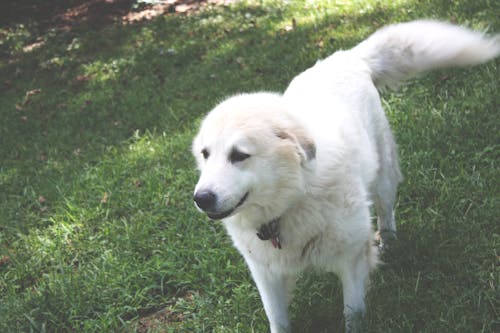Hey there! Some links on this page are affiliate links for Amazon which means that as an Amazon associate, if you choose to make a purchase, I may earn a small comission at no extra cost to you. Thank you so much again for just checking out this page. 🙂

Great Pyrenees are majestic and loyal dogs that are often used as livestock guardians. They are known for their protective nature and their tendency to bark excessively. While barking is a natural behavior for Great Pyrenees, excessive barking can be a nuisance for both the dog and its owners. In this article, we will discuss some tips and tricks for getting your Great Pyrenees to quit barking so much.
1. Find the Root Cause of the Barking
The first step in stopping your Great Pyrenees from barking excessively is to find the root cause of the barking. Great Pyrenees bark for a variety of reasons, such as boredom, anxiety, fear, and territorial behavior. Once you identify the root cause of the barking, you can develop a plan to address the behavior.
2. Socialize Your Great Pyrenees
Great Pyrenees are naturally protective and territorial dogs. One way to reduce their barking is to socialize them from an early age. Socialization involves exposing your dog to different people, animals, and environments. This will help your Great Pyrenees become more comfortable in different situations, which can reduce their anxiety and barking.
3. Provide Adequate Exercise
Great Pyrenees are energetic dogs that require a lot of physical activity. Providing adequate exercise can help reduce your Great Pyrenees’ barking. A tired dog is less likely to bark excessively. Take your Great Pyrenees for daily walks or playtime to help wear them out.
4. Use Positive Reinforcement
Positive reinforcement is a powerful tool for training dogs. When your Great Pyrenees exhibits good behavior, reward them with praise, treats, or toys. This will reinforce the behavior and encourage them to continue the good behavior.
5. Teach the “Quiet” Command
Teaching your Great Pyrenees the “quiet” command is an effective way to reduce their barking. Begin by using a command such as “quiet” or “enough” when your Great Pyrenees barks excessively. When they stop barking, reward them with praise and treats. With practice, your Great Pyrenees will learn to associate the command with the desired behavior.
6. Provide Mental Stimulation
Great Pyrenees are intelligent dogs that require mental stimulation to prevent boredom and anxiety. Provide your Great Pyrenees with interactive toys, puzzle games, or obedience training to provide mental stimulation. This can help reduce their barking and destructive behavior.
7. Consider Professional Training
If your Great Pyrenees’ barking behavior is severe or difficult to manage, consider seeking professional training. A professional dog trainer can help identify the root cause of the barking and develop a customized training plan to address the behavior.
In conclusion
Excessive barking can be a nuisance for both Great Pyrenees and their owners. By identifying the root cause of the barking and using positive reinforcement, you can effectively reduce your Great Pyrenees’ barking behavior. Providing adequate exercise, mental stimulation, and socialization can also help reduce barking. If the behavior is severe or difficult to manage, consider seeking professional training to address the behavior. With patience and consistency, you can help your Great Pyrenees become a well-behaved and happy dog.
Common FAQ’s
- Can you train Great Pyrenees not to bark?
Yes, Great Pyrenees can be trained not to bark excessively through proper training and socialization. It’s essential to start training as early as possible and use positive reinforcement techniques to encourage good behavior. Additionally, it’s important to address the underlying reasons behind the barking behavior, such as anxiety or boredom. Consistency and patience are key when training Great Pyrenees not to bark excessively.
- Why does my Great Pyrenees bark all the time?
There could be several reasons why a Great Pyrenees barks excessively. Some common reasons include boredom, anxiety, territorial behavior, or a lack of proper socialization. It’s important to address the underlying cause of the barking behavior to effectively manage it. Consulting with a professional dog trainer or behaviorist can be helpful in identifying the underlying cause and developing an appropriate training plan.
- Do bark collars work for Great Pyrenees?
Bark collars can be effective in reducing excessive barking behavior in some dogs, but they are not always the best solution. Bark collars can cause stress and anxiety in dogs, and they do not address the underlying cause of the barking behavior. Additionally, Great Pyrenees are known for their thick coats, which can make it difficult for bark collars to work effectively. It’s important to consider other training methods and address the underlying cause of the barking behavior before resorting to bark collars.
- Do Great Pyrenees bark less as they age?
It’s possible for Great Pyrenees to bark less as they age, but it’s not guaranteed. Barking behavior is influenced by several factors, including temperament, training, and socialization. Proper training and socialization can help reduce excessive barking behavior in Great Pyrenees, regardless of age. However, it’s important to note that some Great Pyrenees may continue to bark excessively throughout their lives, especially if the underlying cause of the behavior is not addressed.
